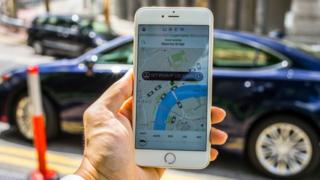 Image copyright
Image copyright
Getty Images
Uber is seeking a five-year licence from Transport for London to continue operating in the city
On 24 November, after a nervous wait, Uber will learn whether its licence to operate in London is to be renewed.
The impending decision has revived debate over whether the data-driven basis for its business model and the “gig economy” jobs it creates are fair.
A wave of platforms has followed, offering new ways to buy and sell, to rent from and temporarily hire others.
Rather than salaried employees, independent contractors are paid by consumers for a specific job – a “gig”.
The platforms in the middle argue they do not employ staff but simply connect customers with people seeking to make money.
Research by the Trades Union Congress (TUC) estimates that one in 10 workers in the UK now regularly does “platform work”.
No company is more symbolic of this shift than Uber itself.
As a consequence, it has become a lightning rod for arguments about what gig work really represents.
Does it usher in new, flexible, liberating ways to work, or is it the means for a kind of arms-length control that undermines basic rights?
Abdura Hadi, an Uber driver who has worked on the streets of London for five years, has noticed a change.
Mr Hadi relies for work on Uber’s job-allocation algorithm but says he is does not know how it works
“On average, I used to work six-to-eight hours, six days a week to provide for my family” he told me. Now, he adds: “It’s 10-to-12 hours.”
He’s noticed that over the period, the number of Uber drivers has rapidly increased, while the number of pick-up jobs has not kept up.
Increased competition has made a particular part of Uber’s platform critical to Mr Hadi and his fellow drivers’ earning power – the software that determines who gets each ride.
However, none of them knows how it works.
“My family depends on the algorithm,” he explains.
“Sometimes it’s scary, but if it was fair, it would be OK.”
Minimum wage
At the heart of the controversy around Uber is that the disruption it has brought isn’t just economic, but also legal.
Definitions that were once reasonably clear in the workplace have become muddied.
The question of whether Uber drivers are actually employees is currently making its way through the British courts.
Even one of the most basic facts of any job has become disputed: how much Uber drivers actually earn.
“It’s a fact that drivers are working on less than minimum wage,” claims Mr Hadi.
Yet a recent study co-authored by researchers at Oxford University and Uber, based on administrative data from the company,…
https://www.bbc.co.uk/news/technology-50418357
















